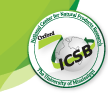Document Type
Oral Presentation
Location
Oxford Convention Center, 102 Ed Perry Boulevard Oxford, MS 38655
Event Website
https://www.oxfordicsb.org/
Start Date
24-4-2023 1:40 PM
Description
Thiazolidinedione (TZD) treatment significantly improves insulin sensitivity and lowers blood glucose via action on adipocytes. Unfortunately, the pro-adipogenic property of TZDs is also associated with bone degradation by inhibiting the action of bone forming cells, or osteoblasts. An ethanol extract of Artemisia dracunculus L., termed PMI 5011, improves blood glucose and insulin sensitivity via action on muscle cells, rather than fat, and may therefore spare bone while lowering blood glucose levels. Here we examine in vitro the effects of PMI 5011 on a pre-osteoblast cell line, MC3T3-E1 cells, during osteogenic differentiation. We hypothesized that PMI 5011 will not inhibit osteogenesis, based on histology, gene expression, and protein expression. To test our hypothesis, MC3T3-E1 cells were induced towards a more mature osteoblast lineage with and without PMI 5011 treatment at concentrations of 0, 3, 10, and 30 µg PMI 5011/mL of culture media. Cell lysates were probed for osteogenic gene and protein expression. Further, cultures were stained for osteogenic endpoints, including alkaline phosphatase, collagen, and mineralization. Contrary to our hypothesis, PMI 5011 at 30 µg/mL significantly increases osteogenic gene expression (e.g., Osteocalcin, Osterix, and Bone Sialoprotein) and initiates earlier mineralization. While cultures treated with 30 µg/mL PMI 5011 display earlier mineralization, mineralization at later timepoints is inhibited in comparison to non-treated cells. PMI 5011 treatment at 30 µg/mL significantly reduced cell proliferation by about twelve percent and may partially explain the disparity in early versus late mineralization. While the current studies do not address the impact of PMI 5011 on bone homeostasis in vivo, our in vitro analysis suggests PMI 5011 has the potential to spare bone health via improved osteoblast maturation and bone formation while enhancing insulin action in skeletal muscle.
Recommended Citation
Scott, Matthew C., "Extract of Artemisia dracunculus L. Modulates the Proliferation and Activity of Osteoblasts" (2023). Oxford ICSB. 11.
https://egrove.olemiss.edu/icsb/2023_ICSB/schedule/11
Publication Date
April 2023
Accessibility Status
Searchable text
Included in
Extract of Artemisia dracunculus L. Modulates the Proliferation and Activity of Osteoblasts
Oxford Convention Center, 102 Ed Perry Boulevard Oxford, MS 38655
Thiazolidinedione (TZD) treatment significantly improves insulin sensitivity and lowers blood glucose via action on adipocytes. Unfortunately, the pro-adipogenic property of TZDs is also associated with bone degradation by inhibiting the action of bone forming cells, or osteoblasts. An ethanol extract of Artemisia dracunculus L., termed PMI 5011, improves blood glucose and insulin sensitivity via action on muscle cells, rather than fat, and may therefore spare bone while lowering blood glucose levels. Here we examine in vitro the effects of PMI 5011 on a pre-osteoblast cell line, MC3T3-E1 cells, during osteogenic differentiation. We hypothesized that PMI 5011 will not inhibit osteogenesis, based on histology, gene expression, and protein expression. To test our hypothesis, MC3T3-E1 cells were induced towards a more mature osteoblast lineage with and without PMI 5011 treatment at concentrations of 0, 3, 10, and 30 µg PMI 5011/mL of culture media. Cell lysates were probed for osteogenic gene and protein expression. Further, cultures were stained for osteogenic endpoints, including alkaline phosphatase, collagen, and mineralization. Contrary to our hypothesis, PMI 5011 at 30 µg/mL significantly increases osteogenic gene expression (e.g., Osteocalcin, Osterix, and Bone Sialoprotein) and initiates earlier mineralization. While cultures treated with 30 µg/mL PMI 5011 display earlier mineralization, mineralization at later timepoints is inhibited in comparison to non-treated cells. PMI 5011 treatment at 30 µg/mL significantly reduced cell proliferation by about twelve percent and may partially explain the disparity in early versus late mineralization. While the current studies do not address the impact of PMI 5011 on bone homeostasis in vivo, our in vitro analysis suggests PMI 5011 has the potential to spare bone health via improved osteoblast maturation and bone formation while enhancing insulin action in skeletal muscle.
https://egrove.olemiss.edu/icsb/2023_ICSB/schedule/11


Comments
Acknowledgments:
NIH T32AT004094